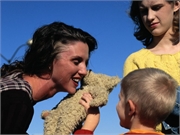- Could Your Grocery Store Meat Be Causing Recurring UTIs?
- Are You Making This Expensive Thermostat Error This Winter?
- Recognizing the Signs of Hypothyroidism
- 10 Strategies to Overcome Insomnia
- Could Artificial Sweeteners Be Aging the Brain Faster?
- Techniques for Soothing Your Nervous System
- Does the Water in Your House Smell Funny? Here’s Why
- Can a Daily Dose of Apple Cider Vinegar Actually Aid Weight Loss?
- 6 Health Beverages That Can Actually Spike Your Blood Sugar
- Treatment Options for Social Anxiety Disorder
Calm Parenting Will Help Children Through Coronavirus Pandemic

The disruptions in daily life caused by the coronavirus pandemic could cause problems for children, but there are things parents can do to help their kids deal with the changes, experts say.
“There are major stressors that children are experiencing, such as the inability to attend school, adjusting to home school, being in the house with their family all day, not being able to see their friends, worrying about grandparents and loved ones — but they seem to be quite resilient and taking all of these changes in stride,” said Alexandria Meyer, an assistant professor of psychology at Florida State University.
Parents can reduce children’s anxiety by limiting their exposure to the news related to COVID-19, having regular, open conversations with children about their understanding of the situation, and doing a reality check on their understanding of the facts, according to Meyer.
“You should encourage your child to discuss their worries with you openly and to do mindfulness or breathing practices to calm their body down,” she said in a university news release. “They can use apps like Headspace. Playing outside and taking walks can also help calm down anxious children — and adults!”
Younger children may be less able to express their distress, according to Isaac Mirzadegan, a doctoral student in clinical psychology who works with Meyer.
“It is normal for children to express stress and anxiety through behaviors instead of through words [e.g., clinginess, sleep difficulties, irritability and temper tantrums, aggressive behavior, hyperactivity and separation anxiety], and parents might see an uptick in behavioral problems during this time,” Mirzadegan said in the release. “Younger children may also need more physical affection to help reduce their distress.”
Children between the ages of 5 and 12 might display more fear, anxiety and problems such as stomach aches or headaches. In response to stress, they may get in spats with siblings, struggle with schoolwork, and socially withdraw.
Teens might have more concentration difficulties, rebellious or risky behavior, or changes in activity levels. They also might be more in need of a supportive environment to talk about how they feel, the researchers said.
Children learn a lot about how to react to situations by watching their parents.
“Parents modeling healthy coping strategies for their children is going to be so important at this time,” Mirzadegan said. “Parents can focus on sharing actionable information, such as when and how to wear face masks and how to practice social distancing, rather than stress-inducing information like the number of COVID-related deaths or the names of celebrities who test positive.”
It’s also a good idea for parents to encourage problem-solving and help children focus on things they can control.
More information
The American Academy of Pediatrics has more on COVID-19.
Source: HealthDay
Copyright © 2026 HealthDay. All rights reserved.










